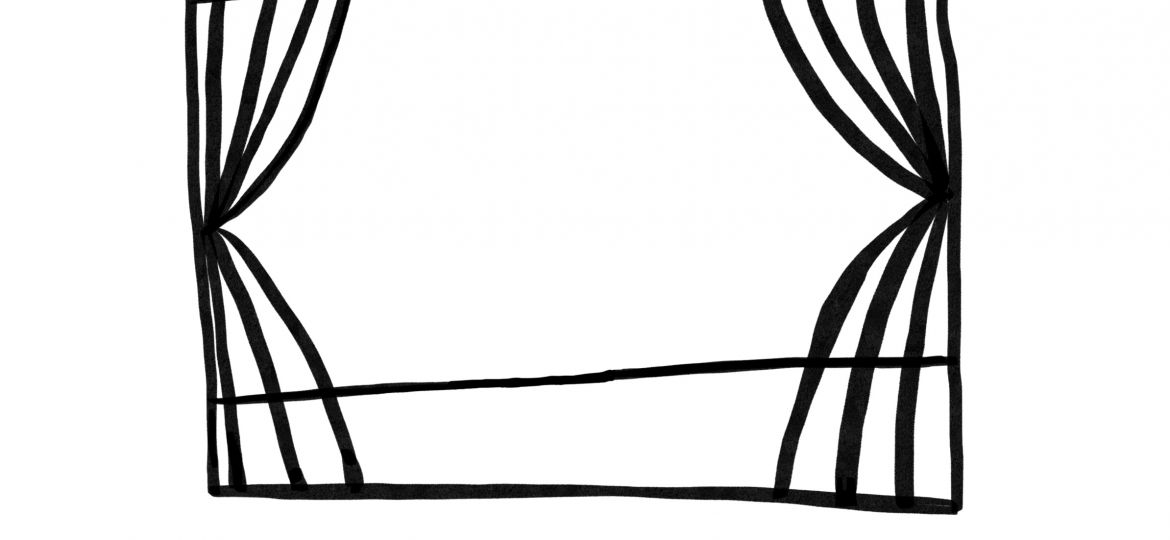
The actors have taken their places, but no curtain rises yet. In a blink of an eye, the lights come up. A young man in a brown suit and round glasses introduces the actors, calling forward the Ingenues, the Middles, and the Elders. Each has a role to play, and they will all take part in telling the story of Manke, Rifkele, and Sholem Asch, the man who wrote them into being.
So begins Carleton College’s production of “Indecent,” written by Paula Vogel and directed by Lee Hannah Conrads. What I found interesting about the staging of “Indecent” was the lack of an “invisible barrier” between the audience and the actors. Had I been sitting another row forward, I would have practically been on stage with them. The set itself was open, inviting me to sit by a metaphorical fire and listen to this haunting and moving tale.
From the moment the actors began, their connection and chemistry on stage was amazing. Most notable was Avram, played by Max Borden ‘25, who embodied each of his characters so perfectly that I often forgot I was only watching one man perform. The role of Avram needs a strong actor with a drive to tell the story, and Borden was the perfect choice. His line, “Because we’re Jewish. Because we’re Polish Jews on Broadway,” sent a shiver down my spine. He said it with such conviction that I nearly stood to tell him to say it again so everyone in the audience could truly feel what was happening. He captured the boyish charm of John just as well as the despair of Asch.
Halina, played by Olivia Patinkin ‘23, was another character I found myself connecting to throughout the play. As she told the story of Rifkele, she was both hilarious and tragic at the same time, perfectly executing her role. She was versatile and committed to every moment, especially the rain scene. Her chemistry with Chana, played by Tonushree Choudhury ‘24, was unmatched, and I found tears in my eyes when they kissed and held each other. I had a chance to chat with Patinkin after the performance, and I asked her, “What moves you about this play?” She answered, “I am Jewish. I would be remiss not to share that story.” The danger in doing a play that is so powerful and so culturally significant is the need for historical and cultural accuracy. According to Patinkin, the cultural aspect was extremely important to her.
I also had the opportunity to speak with Choudhury and asked her the same question about what moved her in this play. “I was very scared because I was embodying a lot of different characters and fitting into the dynamics […] it turned out to be very spiritual,” Choudhury said. I was amazed by her courage to step into this role. Like Borden, she had a way of completely drawing the audience in. When she said, “They cut our rain scene, Dorothy?” no one in the audience even drew a breath until another actor answered. It was a beautiful moment of community that could not be experienced anywhere but live theater.
However, not every moment in the show was as powerful and emotional as the ones I describe above. There were some scenes of stage-combat that felt forced and fake. A father pushed his daughter, but it evoked no profound emotion. When he slapped her, his arm lacked the steadiness needed for choreographed combat. This took me out of the story slightly, but the talented acting that followed made up for it.
The moment that stood out to me the most was when Tosh Le ‘24, who played Mendel, looked me in the eye while he was begging for the visas that the Jewish people so desperately needed from the French ambassador. I felt personally responsible for the lack of visas and the deaths that happened because of them. There are moments in plays where “fourth wall breaks” add to the show rather than detract from it. This was one of them. Le’s choice of making eye contact with an audience member was an excellent one and drew me further into the story.
Overall, this production was incredibly powerful, especially in regard to how truly committed the entire cast was. It is a production that I will never forget.

